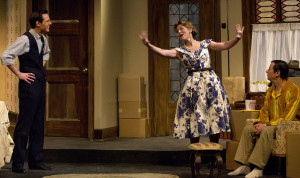Clybourne Park: A worthy production despite a shaky second act

Racism, economic concerns and human tragedy sound unlikely themes for humour. Yet Bruce Norris’s savage satire, Clybourne Park, frequently prompts laughter — perhaps partly because of audience discomfort with being forced to face uncomfortable truths.
The title is taken from the fictional white neighbourhood in Lorraine Hansberry’s 1959 drama A Raisin in the Sun. The address of the house that has just been sold to a black family is the same. Even Karl, the smarmy head of the community association, who tries to block the sale, has the same name and official reason for his attitude. (It will bring the property values down, he says.)
From here, the multi-award-winning Clybourne Park draws back the curtains of any political correctness and goes into attack mode. Before the veil of politeness is ripped away — particularly in the first act — things move slowly. Inane chatter about the origin of the name of a type of ice cream or a discussion about capital cities take a disproportionate amount of time, until the antagonism and fear of “the other” is laid bare.
The beginning of Act I, set in 1959, is delivered as a caricature of a sit-com of the period, as the carefully coiffed and dressed wife, helped by her black housekeeper, pack, in preparation for moving house. Slowly, the tragedy that forced the move is revealed. Enter Karl and his deaf wife — presumably she is a symbol of people’s inability to hear underlying truths — and the gloves are off.
Act II, set 50 years later, has even less of a veneer of correctness. By this time, Clybourne Park has become a predominantly black neighbourhood and the house is up for sale again, this time to a couple of white yuppies, who intend to gentrify the place by tearing it down and building a mansion that exceeds development requirements.
One of the problems here — and it is hard to assess whether it is with the demands of the script or with the Ottawa Little Theatre production — is that the huge contrast between the neat house of Act I and the dilapidated slum of Act II actually supports Karl’s faulty reasoning for opposing the original sale.
As directed by Chantale Plante (who will hopefully not tell audiences what to think before every performance as she did on opening night) the first half of Clybourne Park builds effectively after a creaky beginning. Lawrence Evenchick as Russ, the owner of the house, is highly effective in walking an emotional tightrope, while Linda Webster provides an equally effective counterpoint as the stereotypical 50s housewife. (Kudos to Jeanne Gauthier for the fine costuming.) J. Taylor Morris, as the weak-kneed minister, and the remaining members of the cast complete the well-balanced ensemble.
Act II is a disappointment. The opening is sloppy. The purposeful ugliness of the backdrop is bothersome. The stilted nature of the opening segment of the conversation goes on too long and the crude jokes — as one character says — are not funny.
However, despite the issues with the second half, this is a worthy production of a play that demands and deserves attention.
Clybourne Park continues at Ottawa Little Theatre to January 31, 2015.
Director: Chantal Plante
Set: Robin Riddihough
Lighting: David Magladry
Sound: Robert Krukowski
Costumes: Jeanne Gauthier
Cast
Russ/Dan………………………………………..Lawrence Evenchick
Bev/Kathy……………………………………….Linda Webster
Francine/Lena……………………………………Cherie Hoyte
Jim/Tom/Kenneth………………………………..J. Taylor Morris
Albert/Kevin……………………………………..Eze Leno
Karl/Steve………………………………………..David Holton
Betsy/Lindsey…………………………………….Kirby Naftel